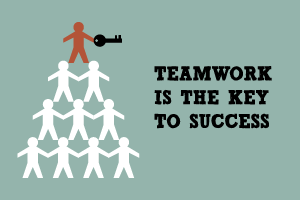Before we get into today’s blog, I’d like to show you a video demonstrating successful teamwork. It was originally released by a French bus company as part of a series of tv commercials a few years ago.
(De Lijn, 2011)
Working in teams, or groups, is something humans, like the ants above, have been doing since prehistoric times. We quickly learnt that life became easier when the tasks of hunting for meat or growing and harvesting fields of crops was shared (Cenere, Gill, Lawson & Lewis, 2015). For a team to succeed though, there are some critical factors that need to be addressed. Likewise, the success of any team requires the support and guidance of a diligent leader (Joseph, n.d.).
What are those factors? Let’s take a look:
- Morale – A term that broadly encompasses a team member’s sense of worth, willingness to complete their tasks, value in the organisation and management.
- Team Harmony – Conflicts in the team can be devastating if left unchecked. It’s the responsibility of the team leader to manage conflicts but all team members must work together to develop a culture of help and harmony.
- Adaptive to Change – Change can come from many sources at any time during a project. A successful team will be able assess the effects of change, determine whether a response is required and how to achieve that response.
- Responsibility – Team members that are willing to share responsibility for results (good or bad) are an indication of high team morale. Although in the team must take responsibility for their own contributions and not look to ‘pass the blame’ to others if something goes wrong.
(Cenere, et al., 2015)
What can the team leader do to achieve this success though?
The leader must understand the difference between managing and leading their team. They must manage the team’s activities through:
- coordination of tasks;
- monitoring progress;
- maintaining team morale; and
- accepting ultimate responsibility for the team’s results.
To be an effective manager, leadership must be used to achieve that success. Strong leaders understand leading requires gaining the trust of the team members. The leader is the able to influence the team behaviours and attitudes through respect gained from that trust relationship (Cenere, et al., 2015).
I’ll end the blog this week with another video. This time a scene from the movie ‘Madagascar’. I think it sums up quite well a team’s ability to adapt to external change as well as displaying a great example of effective team leadership.
(Madagascar 2, 2014)
References
Cenere, P., Gill, R., Lawson, C., & Lewis, M., (2015). Communication skills for business professionals. Port Melbourne, VIC: Cambridge University Press.
De Lijn. (2011, May 16). It’s smarter to travel in groups . Retrieved from https://www.youtube.com/watch?v=mgCIKGIYJ1A
Joseph, C. (n.d.). Importance of a leader in a team. Retrieved from http://smallbusiness.chron.com/importance-leader-team-52168.html
Leadership Management. (2015). Effective teamwork the key to success [image]. Retrieved from http://leadershipmanagement.com.au/wp-content/uploads/2015/09/
Madagascar 2 (2014, June 24). Air penguin (crash landing scene) . Retrieved from https://www.youtube.com/watch?v=Bumx4AerJUQ

Leave a comment